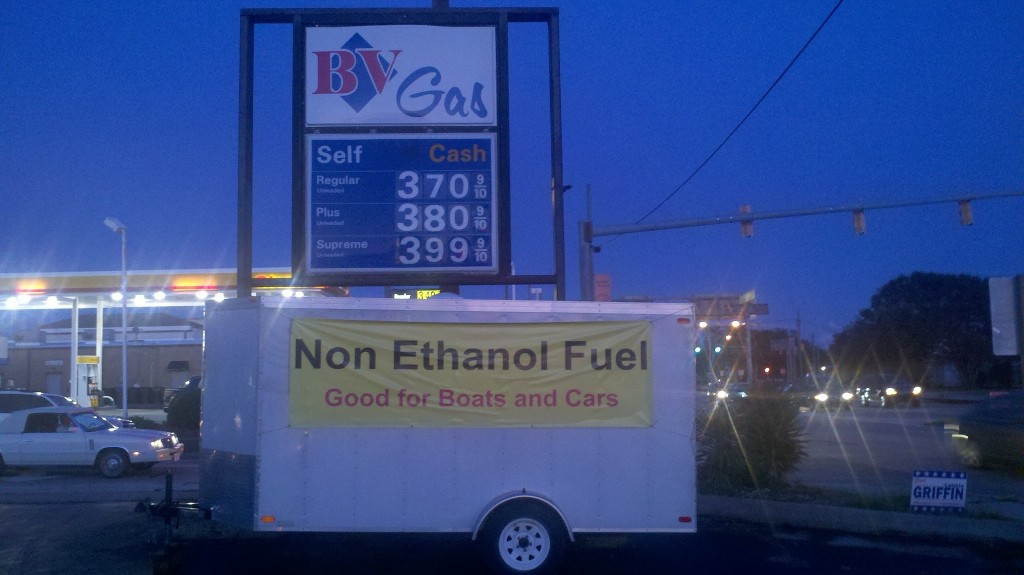
Ethanol. For many boat owners in coastal North Carolina, it’s a dirty word. Since the mid 2000’s, various federal and state regulations have mandated the addition of up to 10% ethanol in gasoline. The reaction has been a combination of legitimate concern and hyperbolic declarations of doom (ecoterrorist have taken over our government and it’s a vast conspiracy to force you to buy a new car every three years – yes, someone said that too me). The rationale for federal mandates come primarily from the Energy Policy Act (2005), the Renewable Fuel Standard Program (2006), and the Energy Independence and Security Act (2007), while state mandates tend to deal with air quality and the recent appearance of methyl tert-butyl ether (MTBE) in the drinking water (ethanol fulfills the same role as MTBE in gasoline). Renewable resources, energy independence, national security, and clean air and water, it would seem that ethanol has a little something for everyone.
Ethanol in fuels and as an additive is not new. Most of the off-the-shelf fuel treatments designed to clean your engine and boost octane are ethanol based and have been around for more than 50 years. Many gas companies that advertise that their fuel will keep your engine clean use ethanol (along with other, proprietary compounds) to accomplish that task. Most carborator cleaners rely on ethanol. So why the backlash?
Part of the backlash stems from the belief among a certain subset of the population that anything the government forces you to do must not be in your best interest. As an a priori irrational assumption, it is impossible to argue against that assertion. Beyond the fanatical fringe, I’ve talked to many boaters, mechanics, and otherwise trustworthy people who are also concerned with the use of ethanol in fuel, specifically with regard to outboard motors, so I decided to dig a little deeper, and find out if there was any truth to the rumor that ethanol will destroy your boat.
The answer, surprising at it seems, is that while most boaters will never notice the switch (and some may experience an increase in fuel efficiency), in a few, very specific, circumstances ethanol additives in fuel can damage your motor.
The Good News
Most outboard motors built in the mid-1990’s or later were designed to handle up to 10% ethanol in fuel (E10) and will have no problem with new gas. Ethanol is a solvent, and will actually keep your engine cleaner than older MTBE fuels, extending the life of your outboard.
The Bad News
The problems with ethanol can be lumped into three major categories based on its chemical properties.
- Ethanol is a solvent
- Ethanol absorbs water
- Ethanol reacts with MTBE
As stated above, ethanol is a solvent. This means that it will clean your engine and fuel lines as you use it. However, putting ethanol into an already dirty system, such as what you’d expect from an older motor (and especially a carborated motor), will dislodge carbon residue that may work its way into the engine, potentially blocking fuel flow or damaging internal parts. Old rubber gaskets that have been hardened may also wear out faster, causing engine failure. These problems can be avoided by overhauling your older motor before switching to E10 fuel. Ethanol will also cause fiberglass to degrade, so if you are unlucky enough to have a fiberglass fuel tank (popular in the worst part of the 1980’s, but riddled with problems and now phased out) you should have it replaced (regardless of fuel used).
Unlike automobiles, marine fuel tanks are vented. This means that fuel stored in a marine fuel tank is always partially exposed to the air. If your boat is near the water (and why would’t it be?) then the ethanol in your gas may absorb moisture. This can be a problem if you don’t have a fuel/water separating filter in your fuel line, as water can enter your motor. A fuel/water separating filter is a good idea, regardless of fuel type, if you want your motor to last as long as possible, but some smaller boats don’t have them. If you have a removable fuel tank, store it somewhere dry when not in use. The other problem with moisture absorption is that if your fuel mixture reaches about 0.5% water, it will undergo phase separation and you will have a layer of gas floating over a layer of ethanol and water. If this happens, you could be drawing nothing but alcohol and water into your engine.
There are some easy ways to avoid this problem. If you trailer your boat, driving to the ramp will be enough to return the alcohol and water to solution. Pay attention to your fuel use, and don’t store more fuel than you need. Instead of topping off your tank at the end of the day, top it off at the beginning of each trip. That way you’ll be adding fresh, well-mixed fuel beforehand instead of storing old, moisture laden fuel.
The final point is the easiest to avoid. Ethanol and MTBE don’t mix well, and can form clumps that block your fuel line. Don’t mix ethanol and non-ethanol gas.
As one final note of caution: there were cases early in the decade of gas stations improperly mixing ethanol in with their fuel, resulting in situations where the gas at the pump could be up to 50% ethanol. This causes massive damage to vehicles that weren’t equipped to handle fuel with greater than a 10% concentration. As ethanol has become more common and the mixing process standardized, this is much less of a concern.
So don’t let the doomsayers keep you from filling up your tank or force you to buy expensive gasoline. Be aware of the issues that can arise with ethanol, but don’t let that keep you off the water.
Disclaimer: I’m a marine biologist, not a mechanic, but I have spent my life on the water, built several boats, and rebuilt multiple outboard engines. I talked to several local boat and small engine mechanics while writing this piece.

Pretty good summary. I grew up around boats, volunteer with the Coast Guard Auxiliary, was raised by a moderately well-known cruising sailor and writer, so I’ve also been keeping a close eye on the ethanol debacle. And yes, it is a debacle.
While the “independence from foreign oil” and “better for the environment” arguments are certainly the cover stories, the real reason for Federal mandates in this case is to provide yet another subsidy to corn growers and processors. Distilling ethanol for fuel usually involves a net loss of energy, so using it actually consumes fossil fuels rather than sparing them.
As for the engine damage, your understanding more or less matches what I’ve heard from inside the boating industry. But for many boaters, that knowledge was hard-won. When E10 first came into use, nobody warned the maritime community that they would need to rebuild their engines, install new equipment, and change their winterizing habits to adapt to it.
As a result, the changeover damaged a whole lot of expensive gear, much of which is installed in extremely inconvenient spaces. Rebuilding an outboard in your back yard is a nice weekend hobby. Rebuilding an inboard that was planked into a cramped sailboat interior thirty years ago is an epic pain in the ass, and replacing a glassed-in gas tank may be tantamount to totaling the boat.
No, E10 didn’t bring about the Boatocalypse, but it probably did create a lot more problems than it solved.
Will GMO corn fuel ethanol welfare for Big oil refiners and Government
motors affect the beef?
Audit the fed, support HR 459 Paul
Thank you for the best article on this issue that I have ever come across. Too many people, when dealing with the subject of ethanol in gasoline – particularly boaters – have given new meaning to the phrase “how to make a mountain out of a molehill”. In addition to your clear and balanced explanations, I should add that one of the problems boaters might have run into stems from the fact that fuel tanks in their boats, especially older models, were often made of fiberglass. Ethanol can cause some damage to the inside surface of these tanks, which might then send residue down the fuel line and cause clogging. In newer boats, this possibility has been eliminated. This is not a complicated problem to solve – certainly not enough to condemn ethanol across the board as so many overreacting boaters tend to do.
It’s been my understanding that ethanol will dissolve fiberglass from the fuel tank into the fuel stream. Is this incorrect?